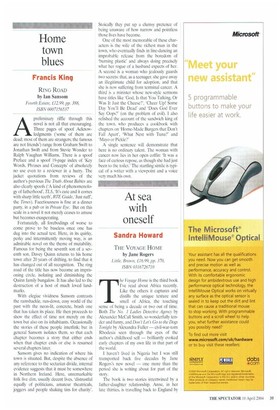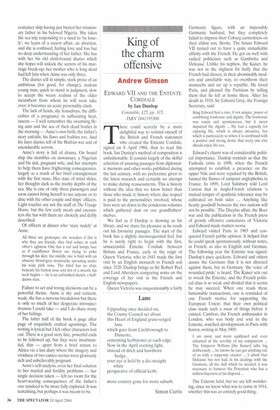At sea with oneself
Sandra Howard
THE VOYAGE HOME by Jane Rogers Little, Brown, £16.99, pp. 370, ISBN 0316726710 The Voyage Home is the third book I've read about Africa recently. Like the others it captures and distills the unique texture and smell of Africa, the touching sense of being a decade or two out of time. Both The No. 1 Ladies Detective Agency by Alexander McCall Smith, so wonderfully tender and funny, and Don't Let's Go to the Dogs Tonight by Alexandra Fuller — civil-war-torn Rhodesia seen through the eyes of the author's childhood self — brilliantly evoked early chapters of my own life in that part of the world.
I haven't lived in Nigeria but I was still transported back five decades by Jane Rogers's new novel — one more than the period she is writing about for part of the story.
The book is two stories intertwined by a father-daughter relationship. Anne, in her late thirties, is travelling back to England by container ship having just buried her missionary father in his beloved Nigeria. She takes the sea trip responding to a need to 'be lonely': we learn of a recent affair, an abortion, and she is confused, feeling love and loss but no deep understanding of her father. She has with her his old cloth-bound diaries which she hopes will unlock the secrets of his marriage break-up; her mother who is long dead had left him when Anne was only three.
The diaries tell in simple, stark prose of an ambitious (for good, for change), zealous young man, quick to stand in judgment, slow to accept the weary realism of the older incumbent from whom he will soon take over; it becomes an acute personality clash.
The lack of funds, shy houseboys, the difficulties of a pregnancy in suffocating heat, insects — I well remember the swarming flying ants and the sea of their dead bodies in the morning — Anne's own birth, the father's story unfolds: his flaws and frailties too. And his later diaries tell of the Biafran war and of unendurable sorrow.
Anne's story is full of drama. On board ship she stumbles on stowaways, a Nigerian and his sick, pregnant wife, and her attempts to help them have frightening consequences, largely as a result of her brief entanglement with the first mate. Her state of mind slides, her thoughts dark as the murky depths of the sea. She is one of only three passengers and soon cannot bring herself to see anyone or to dine with the other couple and ships' officers. Light touches are not the stuff of The Voyage Home, but the few early meals and encounters she has with them are choicely and deftly described.
Of officers at dinner who 'stare rudely' at Anne:
All three are grotesque; she wonders if this is why they are friends, they find solace in each other's ugliness. One has a red and lumpy face as if cauliflower florets are trying to poke through his skin; the middle one is bald with an obscene blond-grey moustache sprouting under his wide pink nose. The third has no chin; beneath his button nose and dot of a mouth, his neck begins — he is an unfinished sketch, a halfdrawn man.
Failure to act and wrong decisions can be a powerful theme. Anne is shy and reticent, weak, she has a nervous breakdown but there is only so much of her desperate introspectiveness I could take — and I do share many of her failings The latter half of the book is page after page of exquisitely crafted agonisings. The writing is lyrical but I felt other characters lost out. There is a good story line, powerful ends to be followed up; but they were insubstantial, thin — apart from a brief return to Africa via a last diary where the imagery and vividness of two cameo scenes were gloriously rich and unbelievably poignant.
Anne's self-analysis, even her final solution to her marital and fertility problems — her single decision taken — left no room for the heart-searing consequences of the father's one misdeed to be more fully explored. It was tantalising, but perhaps it was meant to be.



































































 Previous page
Previous page